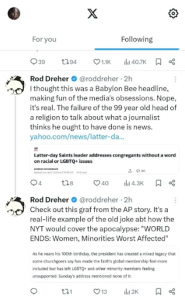The Associated Press (AP) one of the most influential news organizations in the United States published an article about the most recent general conference of The Church of Jesus Christ of Latter-day Saints.
The result is a disaster of journalistic credibility. This article makes it clear the AP is unfit to publish authoritative news about the Church, at least until it makes significant changes in its processes.
Rod Dreher, the influential writer and editor, quipped in response to the AP’s most recent article, ”I thought this was a Babylon Bee headline.” That reaction has become a bit too common in responses to coverage of The Church of Jesus Christ of Latter-day Saints in national media. But it’s usually aimed at publications with established editorial bents, like Rolling Stone Magazine. That the AP has joined its ranks is sad.

The AP article had the headline, “Latter-day Saints leader addresses congregants without a word on racial or LGBTQ+ issues.” Dreher remarked, “I thought this was a Babylon Bee headline, making fun of the media’s obsessions. Nope, it’s real. The failure of the 99-year-old head of a religion to talk about what a journalist thinks he ought to have done is news.”
That’s right. The Associated Press published a “news” story about what wasn’t discussed in the conference.
Leaders of the Church of Jesus Christ also didn’t speak about the War in Gaza, the population crisis in South Korea, how well the Armenian dram is performing against the dollar, or Javier Bardem’s stunning performance in Dune Part Two. What she produced is about what you would expect from a person in her position.
Perhaps most egregiously, the headline is factually inaccurate! During Nelson’s remarks on Sunday afternoon, he said, “[God] invites all to come unto Him—black and white, bond and free, male and female; … all are alike unto God.” He explicitly mentioned race in his remarks. Not to mention the dozens of remarks that touched on issues of love, charity, and truth, which explains, even if not directly, how the Church approaches LGBT+ issues.
And this is not merely bad coverage by Hannah Schoenbaum who wrote the article. Schoenbaum’s entire beat is covering LGBT+ issues at state houses. The editor who assigned Schoenbaum to the conference did so, knowing precisely what would come out of the narrow point of view of her coverage specialty.
As the saying goes, If the only tool you have is a hammer, you tend to see every problem as a nail. Or, in this case, all you can see is there are no nails, ignoring both the beauty and actual news that is there.
Please, don’t focus your ire on Schoenbaum. What she produced is about what you would expect from a person in her position. The true blame lies at the feet of the journalistic system that put her in the position to fail. Does the AP truly not have a single journalist in Utah who is religiously literate? Until they get one, perhaps they shouldn’t try and cover explicitly religious events. They simply don’t have the right personnel to do it right, as Schoenbaum demonstrates.
Schoenbaum lacks a fair bit of religious literacy in her article. She uses language foreign to the Latter-day Saint tradition, such as “Church’s leadership panel,” “Nelson’s top adviser,” or “heretics.” She also makes the statement, that the priesthood exclusion was “a policy in the belief that black skin was a curse,” which is at best controversial, without any mention of the fact that neither the Church nor most of its members endorse this version of history.
However, the article is not only bad in its framing and its lack of religious literacy. It was written to be a straight news story and is peppered with negative editorializing of the faith. She mentions Nelson’s work of reasserting the Church’s full name but describes it as a “sharp shift.” Then adds a frequent line used by critics of President Nelson about the previous ‘I’m a Mormon’ campaign but she states it as a simple fact in her own voice, not attributing it to critics. She doesn’t mention any of the reasons that have been used to support the request.
She describes temples as “lavish,” a description that may feel apt to those who are critical of the temple but not one that would feel appropriate to the Church or its many members.
She brings in a wild non sequitur about a speech given by a different church leader at BYU and says it’s “known as the ‘musket fire speech’” without clarifying that it is only known this way by those attempting to discredit the remarks.
Schoenbaum additionally claims there are “ongoing tensions between church leadership and LGBTQ+ members” without mentioning the many LGBT+ members who are at home in the Church and do not feel the “tension” she assumes in her statement. What she produced is about what you would expect from a person in her position.
Schoenbaum frequently covers the Utah legislature, so in case she gets the assignment next October as well, let me pass along some directions from the capital. One block south, one block west. That’s it. That’s the conference center. It’s so easy to find from the capital anyone can do it. And if you can manage the ten-minute walk, there are tens of thousands of sources who would be more than happy to talk to you about what was said at conference, rather than what was not said.
The problem, of course, is that it wouldn’t fit with the narrative that was predestined for this story from the second it was conceived.
This kind of deeply flawed coverage is antagonistic to Latter-day Saints. And because it was published by the Associated Press it will be reprinted to media markets across the country. In most of those markets, Latter-day Saints are religious minorities. The narratives imposed on these stories are used by those in these markets trying to stop Latter-day Saints from being able to build places of worship. And this agitation over the different worldview of Latter-day Saints from the broader culture over sexuality inspires vandalism and other hate crimes.
Come on, AP. Latter-day Saints are actual, real people. And we deserve to be treated like it. This coverage is embarrassing for you. Do better.
Correction: The 16th paragraph has been corrected. It previously said Schoenbaum didn’t interview anyone “celebrating” his birthday, it has been changed to read “speaking in celebration of his birthday.”
















